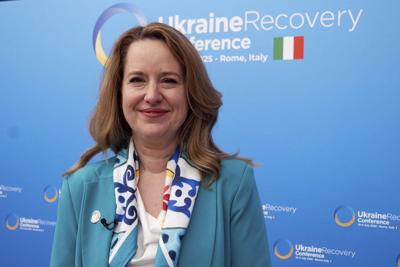The head of the United Nations migration agency has warned that tougher border policies coupled with cuts to development aid could fuel instability and worsen migration pressures, rather than solve them.
Speaking to the Associated Press on Thursday, Amy Pope, Director General of the International Organisation for Migration (IOM), called the current Western approach to migration “short-sighted” and urged governments to invest in stabilising communities in countries of origin.
“If you want to manage irregular migration, then you need to make investments in stabilising populations closer to where the migration begins,” she said. “It is short-sighted to cut foreign assistance without identifying alternatives to make sure that populations are not on the move.”
Pope spoke in Rome on the sidelines of an international conference on Ukraine’s reconstruction, as several European governments push for stricter border controls and increased deportation efforts.
On Thursday, Greece was set to approve a proposal to suspend asylum applications for all migrants arriving by sea from Libya, after a spike in landings.
Pope warned that such measures, if not paired with development support and planning, could exacerbate instability. She pointed to Syria as a cautionary example, saying premature returns could be counterproductive.
“If Syrians go home too quickly and they’re facing further destabilisation, further conflict, if their children aren’t safe, if their homes are still destroyed and they have nowhere to go, that could actually backfire,” she said.
She also noted that tighter U.S. border policies have shifted migration patterns southward, straining countries like Panama, Costa Rica, and others along alternative routes.
“We’re seeing a reversal of the flows. Not only are fewer people coming to the United States and Mexico border, more are actually heading south,” Pope said, raising concerns about the capacity of those nations to cope.
Pope highlighted Italy’s migration policy as a promising model, combining border enforcement with legal pathways for migrant workers. Italy plans to issue nearly 500,000 permits for non-EU workers over three years starting in 2026, in collaboration with employers.
“You can’t have enforcement on its own without addressing the pull factors that are encouraging migrants to come,” Pope said, calling Italy’s plan an “experiment” worth watching.
“We encourage other governments to watch what’s happening in this space closely,” she added.

